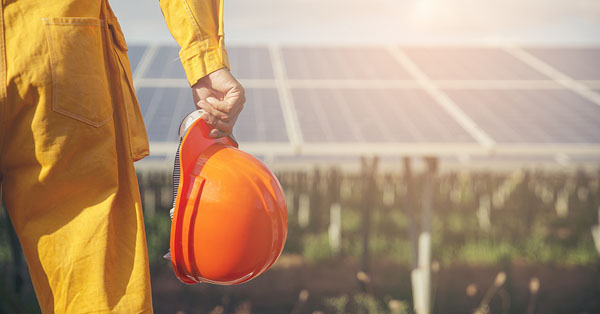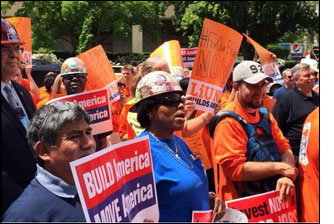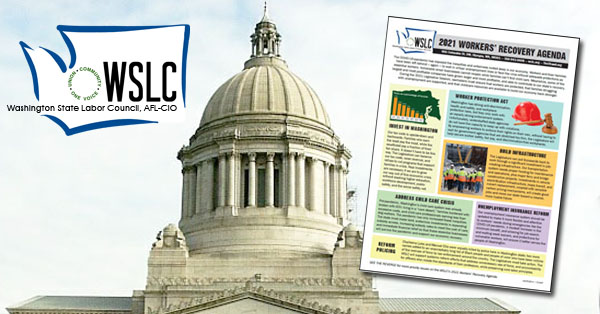STATE GOVERNMENT
Our tax dollars should support our labor, environmental values
Support ‘Buy Clean, Buy Fair’ legislation to promote high standards. Public hearing Jan. 26.
OLYMPIA (Jan. 26, 2021) — Washington state should leverage its public purchasing to promote good labor and environmental standards. That’s why the Washington State Labor Council, AFL-CIO is supporting important legislation this year that would spotlight clean and responsible employers when the state purchases materials for its infrastructure projects.
HB 1103, the “Buy Clean, Buy Fair” legislation sponsored by Rep. Davina Duerr (D-Bothell), will get a public hearing today at 1:30 p.m. in the House Capital Budget Committee.
TAKE A STAND — The WSLC urges all union members and supporters to show their support for this legislation. Download this one-pager with more information on the Buy Clean, Buy Fair bill and then register your support for HB 1103 here. Then you can watch the hearing at 1:30 p.m. today here.
The Buy Clean, Buy Fair Washington Act

Buy Clean and Buy Fair policies promote spending taxpayer dollars on materials that are manufactured with high environmental and labor standards. This harnesses existing state spending to cut industrial carbon emissions and level the playing field for local and domestic manufacturers with responsible business practices that invest in reducing pollution.
The Challenge
Washington, like most states, currently does not consider carbon pollution or working conditions in purchasing materials for publicly-funded infrastructure projects. Polluting and exploitative manufacturers—often outside the United States—are treated the same as manufacturers that meet high environmental and labor standards. This puts clean and responsible producers at a competitive disadvantage and drives manufacturers out of state and offshore in search of lower-cost production.
The resultant decline in local and domestic manufacturing has eroded the middle class and contributed to soaring income inequality. Washington has been hit especially hard by trade-related job loss—and it is accelerating. Recent analysis from the Washington Fair Trade Coalition Education Fund shows that trade-related job loss increased 133% from 2017-2019 relative to 2014-2016.
This race to the bottom is also bad for our climate. Each year, the United States imports manufactured goods containing 1.4 gigatons of “embodied” greenhouse gas emissions. Many of these materials could be produced by American workers but are now imported from countries with lower environmental standards. Researchers estimate that nearly 25 percent of the world’s total emissions pass through this “carbon loophole.”
The Opportunity
 Washington can leverage the hundreds of millions of taxpayer dollars it spends each year on public works to close the carbon loophole and promote fair competition by incorporating carbon emissions and labor standards into purchasing of materials for state-funded infrastructure projects.
Washington can leverage the hundreds of millions of taxpayer dollars it spends each year on public works to close the carbon loophole and promote fair competition by incorporating carbon emissions and labor standards into purchasing of materials for state-funded infrastructure projects.
This promotes competitiveness for responsible Washington manufacturers that invest in efficiency upgrades and pollution controls. It also sets the stage for a new era of Washington manufacturing by growing demand for fairly-produced low-carbon materials.
Demand for low-carbon materials is already rising rapidly. For example, Apple recently announced that it is tackling emissions throughout its supply chains by integrating cutting edge low-carbon aluminum. Washington-based manufacturers are perfectly positioned to capture this demand with the state’s green electric grid, inexpensive commercial electricity, and skilled workforce.
Policy Summary
The Buy Clean and Buy Fair Washington Act is an important first step toward cutting embodied carbon and eliminating polluting and exploitative manufacturers’ unfair advantage.
The policy establishes reporting on the quantity and carbon content of structural materials purchased for public works, as well as the labor conditions at production facilities. It also establishes a publicly-accessible database to enable reporting and promote transparency.
Disclosure will yield insight into existing purchasing and material use. This will provide policymakers with useful data to establish ambitious but reasonable performance standards that are Washington-specific. In addition, disclosure requirements will build industry capacity to meet performance standards in the future.
Leveraging public purchasing to maximize public good is not novel. For instance, Washington currently requires that state contractors pay prevailing wage and meet apprenticeship utilization requirements. This promotes high-road job creation and maintains a skilled and trained workforce. The Buy Clean and Buy Fair Washington Act similarly aligns public spending with the state’s climate change and economic competitiveness goals.
Buy Clean and Buy Fair also advances Washington’s commitment to high-performance buildings. State-funded building projects over 5,000 square feet and major renovations must meet at least LEED Silver Standards. Executive Order 20-01 further raised the bar by calling for all new state buildings to be zero energy or zero energy-capable and to consider net-embodied carbon. The Buy Clean and Buy Fair Washington Act is a move to achieve that aim.
Policy Details
Covered projects. The policy applies to construction projects larger than 25,000 square feet or building renovation projects where the cost is greater than 50 percent of the assessed value and the project is larger than 25,000 square feet.
Covered products. The policy applies to a specific set of products across four categories of materials: structural concrete, reinforcing steel, structural steel, and engineered wood products. Eighty percent of a building’s embodied carbon footprint is from structural materials.
Embodied carbon reporting. The policy requires state contractors to submit Type III environmental product declarations (EPDs) for covered products. Often described as “nutrition labels”, EPDs are the building industry standard for reporting embodied carbon. The Buy Clean and Buy Fair Washington Act requires that EPDs include supply-chain specific data for production processes that contribute as much as 80 percent or more of a product’s cradle to gate global warming potential and report the overall percentage of supply-chain specific data. This ensures accurate reporting because end-stage fabricators or manufacturers cannot substitute industry averages for upstream materials that account for a majority of a product’s carbon footprint. It is important to note that EPDs can only be used to evaluate the carbon footprint of products within a product category; they cannot be used to compare products across material categories.
Labor conditions reporting. State contractors must report on working conditions at the production facilities that manufacture goods used in public works and what steps, if any, manufacturers have taken to promote and protect the International Labor Organization’s Fundamental Principles and Rights at Work. The labor reporting requirements are modeled on well-established precedents, including Washington’s Annual Tax Performance Reports and the California Transparency in Supply Chains Act.
Data reporting and compliance. The College of Built Environments at the University of Washington will build a publicly-accessible database to track data and compliance and to promote transparency. Reporting requirements will be phased in over a period of three years to allow manufacturers that do not already have EPDs an opportunity to generate data.
For more information, email Jessica Koski, Washington State Policy Coordinator, BlueGreen Alliance.
ALSO at The Stand — Washington can exit the race to the bottom (by Gaylan Z. Prescott) — “Buy Clean and Buy Fair Washington Act” would use our state tax dollars to support our labor, environmental values.






